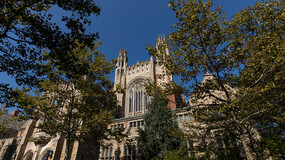Vicki Schultz
J.D., Harvard Law School
B.A., University of Texas
- Employment Discrimination Law
- Family Law
- Family, State and Market
- Workplace Theory and Policy
- Work and Gender
- Law and Social Science
- Feminist Theory
J.D., Harvard Law School
B.A., University of Texas
Vicki Schultz is the Ford Foundation Professor of Law and Social Sciences at Yale Law School, where she teaches courses on the family, state and market, family law, employment discrimination law, workplace theory and policy, work and gender, law and social science, feminist theory, and related subjects. Schultz has written and lectured widely on a variety of subjects related to antidiscrimination law, including sexual harassment, sex segregation on the job, work-family issues, working hours, and the meaning of work in people’s lives. She has also lectured on family law and intimate life, including topics related to same-sex marriage and marriage generally. Her published work includes “Feminism and Workplace Flexibility,” 42 Connectitcut Law Review 1203 (2010),“The Sanitized Workplace Revisited,” in Martha Fineman, Jack Jackson and Adam Romero, eds., FEMINIST AND QUEER LEGAL THEORY (2009), “Sex and Work,” 18 Yale Journal of Law and Feminism 223 (2006), “The Need for a Reduced Workweek in the United States,” in Judith Fudge & Rosemary Owen, eds., THEORY PRECARIOUS WORK, WOMEN, AND THE NEW ECONOMY: THE CHALLENGE TO LEGAL NORMS (2006), “The Sanitized Workplace,” 112 Yale Law Journal 2061 (2003), “Life’s Work,” 100 Columbia Law Review 1881 (2000), “Reconceptualizing Sexual Harassment,” 107 Yale Law Journal 1683 (1998), and “Telling Stories About Women and Work: Judicial Interpretations of Sex Segregation on the Job in title VII Cases Raising the Lack of Interest Argument,” 103 Harvard Law Review 1749 (1990).
Professor Schultz is currently working on an intellectual history of antidiscrimination law, “Antidiscrimination as Disruption,” that lays out the historical conceptual frameworks for understanding and addressing discrimination and then traces the emergence of a new framework that treats the formation of social identity as a fluid process in which institutional dynamics play a significant role. With co-author Michael Yarbrough, she is also writing an article, “Will Marriage Make Gay and Lesbian Couples Less Egalitarian? A Cautionary Tale,” that analyzes the likely effects of legal marriage on the division of housework and childcare in gay and lesbian households. At the heart of this article are the questions: what is marriage and what work does it do?
Schultz's work has been influential in scholarly circles in both law and the social sciences; her work has also been cited widely in the courts and the national news media. She has been quoted in The New York Times Magazine, The New Yorker, Ms. Magazine, and many major newspapers; she has appeared on The News Hour with Jim Lehrer, The CBS Evening News, ABC World News Tonight, Good Morning America, and National Public Radio.
Schultz has held a number of significant professional posts, fellowships and visiting professorships. She is a past president of the Labor and Employment Section of the Association for American Law Schools and a past Trustee of the Law and Society Association. She has been the Evelyn Green Davis Fellow at the Radcliffe Institute for Advanced Study at Harvard University, a fellow at the Center for the Advanced Study of the Behavioral Sciences at Stanford University, and a fellow at the Whitney Humanities Center at Yale University. She has been a visiting professor at Harvard Law School (her alma mater), and in 2010-2011, she was the MacDonald-Wright Visiting Professor of Law and Faculty Chair of the Williams Institute at the UCLA School of Law. A former trial attorney at the United States Department of Justice, Civil Rights Division, Schultz began her academic career at the University of Wisconsin Law School, where she became interested in law and sociology. At Yale Law School, she runs the Workplace Theory and Policy Workshop and has also headed the Work and Welfare group, an interdisciplinary group of scholars who study inequalities produced by different social welfare regimes, labor market institutions, and family formations. Schultz lives in Connecticut with her daughter Natalie and their cat Jack.



Open Statement on Sexual Harassment from Employment Discrimination Law Scholars, 71 Stan. L. Rev. Online 17 (2018).
Reconceptualizing Sexual Harassment, Again, 128 Yale L.J.F. 22 (2018).
Taking Sex Discrimination Seriously, 91 Denver U. L. Rev. 995 (2015) (Lead article in symposium issue, Revisiting Sex: Gender and Sex Discrimination Fifty Years after the Civil Rights Act). Reprinted in Women and the Law (Tracy A. Thomas ed., Thomson Reuters. 2016, pp. 465-594).
Interview with David L. Rose, in Employment Discrimination: 45 Years of Enforcement of Title VII of the Civil Rights Act of 1964, 1 Am. U. Labor. & Emp. L.F. 161, 181 (2011).
Feminism and Workplace Flexibility, 42 Conn. L. Rev. 1203 (2010).
The Sanitized Workplace Revisited, in Feminist and Queer Legal Theory: Intimate Encounters, Uncomfortable Conversations 65 (Martha Albertson Fineman, Jack E. Jackson & Adam P. Romero eds., Ashgate Pub. 2009) (reply in the same anthology by Jack Jackson & Tucker Culbertson, Proper Objects, Different Subjects, and Juridical Horizons in Radical Legal Critique, p. 135).
Understanding Sexual Harassment Law in Action—What Has Gone Wrong and What We Can Do About It, 29 T. Jefferon L. Rev. 1 (2006) (lead article in symposium issue with responses by Ruben J. Garcia, Barbara A. Lawless, M. Isabel Medina, Christine Williams, and Richard A. Paul).
Sex and Work, 18 Yale J.L. & Feminism 233 (2006).
The Need for a Reduced Workweek in the United States, in Precarious Work, Women, and the New Economy: The Challenge to Legal Norms 131 (Judith Fudge & Rosemary Owen eds., Hart Pub. 2006) (with Allison Hoffman).
El lugar de trabajo higienizado, 7 Revista Jurídica de la Universidad de Palermo 101 (María Luisa Piqué trans., 2006) (The Sanitized Workplace, translated and reissued as subject of a symposium, with responses by Paola Bergallo and María Luisa Piqué).
A Tribute Honoring James E. Jones, Jr., 9 Empl. Rts. & Employ. Pol’y J. 525 (2005).
Global Perspectives on Workplace Harassment Law, 8 Empl. Rts. & Employ. Pol’y J. 151, 187 (2004).
The Sanitized Workplace, 112 Yale L.J. 2061 (2003). Reprinted in NYU Selected Essays on Labor and Employment Law: Behavioral Analyses of Workplace Discrimination (Mitu Gulati & Michael Yelnosky eds., Kluwer Acad. 2007, pp. 205-327); William N. Eskridge & Nan D. Hunter, Sexuality, Gender, and the Law (Foundation Press 2d ed. 2004, pp. 762-64; 3d ed. 2011, pp. 564-66).
Roundtable Discussion: Subversive Legal Moments? 12 Texas J. Women & L. 197, 203 (2003) (remarks delivered at the University of Texas School of Law, Symposium on Subversive Legacies: Learning from History / Constructing the Future).
Race and Competence in the Academy, 6 Empl. Rts. & Employ. Pol’y J. 129, 178 (2002).
Labor’s Subjects, in Lives in the Law 132-213 (Austin Sarat, Martha Umphrey & Lawrence Douglas eds., U. Mich. Press 2002).
Sexual Harassment: Legal Perspectives, in International Encyclopedia of the Social and Behavioral Sciences 13982-13987 (Paul B. Bates & Neil J. Smelser eds., Elsevier Pub. Ltd. 2001) (with Eileen Goldsmith).
Talking About Harassment, 9 J.L. & Pol’y 417 (2001). Reprinted in Mark Rothstein & Lance Liebman, Employment Law: Cases and Materials (Foundation Press 6th ed. 2007, pp. 595-96; 7th ed. 2011, pp. 588-89; 8th ed. 2015).
Religion in the Workplace, 4 Empl. Rts. & Employ. Pol’y J. 87, 130 (2000) (remarks delivered at 2000 Annual Meeting of the Association of American Law Schools Section on Law and Religion, Symposium on Religion in the Workplace).
Life’s Work, 100 Colum. L. Rev. 1881 (2000) (responses by Martha Ertmann, Deborah Rhode, and Joan Williams, 102 Columbia L. Rev. 812-64 (2002)). Reprinted in Martha Mahoney, John O. Calmore & Stephanie Wildman, Cases and Materials on Social Justice: Professionals, Communities, and Law (Thompson West 1st ed. 2003, pp. 551-56; 2d ed. 2013, pp. 587-93); Katharine T. Bartlett, Angela P. Harris & Deborah L. Rhode, Gender and Law: Theory, Doctrine and Commentary (Aspen Pub. 3d ed. 2002, pp. 839-42, 1173-79; 4th ed. 2006, pp. 668-71, 950-52; 5th ed. 2009, pp. 457-61, 651; 6th ed. 2013, pp. 534-37, 766-68).
Una explicación Alternative del acoso por un Ambiente Laboral Hostil: Un Paradigma Basado en La Competencia, Derecho y Grupos Desaventajados, Editorial Gedisa Project (Roberto Gargarella ed., Barcelona 1999, pp. 103-36) (Reconceptualizing Sexual Harassment translated and reissued).
Reconceptualizing Sexual Harassment, 107 Yale L.J. 1683 (1998). Reprinted in Libby Adler, Lisa Crooms-Robinson, Judith Greenberg, Martha Minow & Dorothy Roberts, Mary Joe Frug’s Women and the Law, (Foundation Press 3d ed. 2004, pp. 155-64; 4th ed. 2008, pp. 718-28); Robin D. Barnes, The Nature and Scope of Individual Rights: Emerging Debates in Constitutional Law (Carolina Acad. Press 2007); Gender and Feminist Theory in Law and Society (Madhavi Sunder ed., Ashgate Pub. 2007); Katharine T. Bartlett, Angela P. Harris, and Deborah L. Rhode, Gender and Law: Theory, Doctrine and Commentary (Aspen Pub. 4th ed. 2006, pp. 418; 5th ed. 2009, pp. 291; 6th ed. 2015, pp. 337); Catharine MacKinnon, Sex Equality: Lesbian and Gay Rights, (Foundation Press 2d ed. 2007, pp. 160-61); Michael J. Zimmer, Charles A. Sullivan, Richard F. Richards, Deborach A. Calloway, Cases and Materials on Employment Discrimination (Aspen Pub. 6th ed. 2003).
Sex is the Least of It: Let’s Refocus Harassment Law on Work, Not Sex, The Nation 11 (May 25, 1998), reprinted in Business Ethics (John Richardson ed., McGraw-Hill 11th ed. 1999); reprinted as Male Domination of the Workplace Causes Sexual Harassment, in Sexual Harassment 80 (Louise I Gerdes ed., Greenhaven Press 1999).
Race, Gender, Work and Choice: An Empirical Study of the Lack of Interest Defense in Title VII Cases Challenging Job Segregation, 59 U. Chi. L. Rev. 1073 (1992) (with Stephen Petterson). Reprinted in Catharine MacKinnon, Sex Equality: Lesbian and Gay Rights (Foundation Press 2d ed. 2007, p. 208).
Women ‘Before’ the Law: Judicial Stories About Women and Work, in Feminists Theorize the Political 297-338 (Judith Butler & Joan Scott eds., Routledge 1992). Reprinted in Feminist Legal Theory: Readings in Law and Gender (Katharine Bartlett & Rosanne Kennedy eds., Westview Press 1991).
Telling Stories About Women and Work: Judicial Interpretations of Sex Segregation in the Workplace in Title VII Cases Raising the Lack of Interest Argument, 103 Harvard L. Rev. 1749 (1990). Reprinted in Katharine T. Bartlett, Angela P. Harris & Deborah L. Rhode, Gender and Law: Theory, Doctrine and Commentary (Aspen Publishers 6th ed. 2013, p. 166); William Eskridge & Nan Hunter, Sexuality, Gender, and the Law (Foundation Press 2d ed. 2004, pp. 834-38); Judith Greenberg, Martha Minow & Dorothy Roberts, Mary Joe Frug’s Women and the Law (Foundation Press, 3d ed. 2004, pp. 187-95; 4th ed. 2008, pp. 538-47); Foundations of Employment Law (John J. Donohue III ed., Foundation Press 2d ed. 1997, pp. 355-64; 3d ed. 2003); Michael J. Zimmer, Charles A. Sullivan, Richard F. Richards, Deborach A. Calloway, Cases and Materials on Employment Discrimination (Aspen Pub. 5th ed. 2000); Feminist Legal Theory, Volume II: Positioning Feminist Theory Within the Law (Frances E. Olsen ed., NYU Press 1995, pp. 361-75); Feminist Legal Theory: Readings in Law and Gender (Bartlett & Kennedy eds., Westview Press 1991, pp. 124-55).
Room to Maneuver (f)or a Room of One’s Own? Practice Theory and Feminist Practice, 14 Law & Soc. Inquiry 123 (1989).
